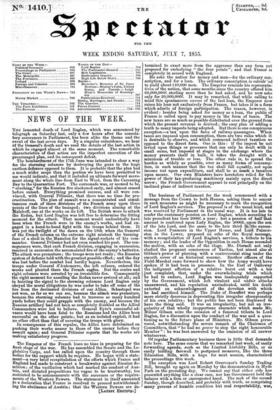NEWS OF THE WEEK.
THE lamented death of Lord Raglan, which was announced by telegraph on Saturday last, only a few hours after the consola- tory assurances in Parliament, has been alike the theme and the event of the last seven days. By a singular coincidence, we hear of the General's death and we read the details of the last action in which he engaged almost at the same moment. The remarkable characteristics of that action are the imperfect execution of the prearranged plan, and its consequent defeat.
The bombardment of the 17th June was intended to clear a way for the storming columns by destroying the guns in the huge earthen defences opposed to them. It is probable that the plan had a much wider scope than the portion we have been permitted to see would indicate, and that it included an ultimate forward move- ment along the whole line from East to West, from the Careening Bay to the Quarantine Fort. The cannonade was, or seemed to be, "crushing," for the Russian fire slackened early, and almost ceased before sunset. Everything promised success, and all were con- vinced, with General Pelissier, that there was no time for pro- crastination. The plan of assault was a concentrated and simul- taneous rush of three divisions of the French army upon three points of the lines of the besieged ; two divisions aiming at the Malakoff, one at the works on its left. The British were to attack the Redan, but Lord Raglan was left free to determine the fitting moment for the attack. That moment would undoubtedly have been when the French were in the enemy's works, and had en- gaged in a hand-to-hand fight with the troops behind them. It was yet the twilight of the dawn on the 18th when the General of the French column on the extreme right mistook the burning fuse of a shell in the Mamelon for the signal-rockets of his com- mander. General Pelissier had not even reached his post. The con- sequences were, that each French division, engaging in succession, received in succession the accumulated fire of the enemy's batteries. The attack was premature ; the troops were not ready ; the Russian system of defence told with the greatest possible effect ; and the day was lost before the combat had hardly begun. Nevertheless, the troops under General d'Autemarre, the left column, entered the works and planted there the French eagles. But the centre and right columns were arrested by an irresistible fire. Consequently the right moment for assailing the B.edan never arrived at all; and in hoisting the signal to the storming columns Lord Raglan only obeyed the moral obligations he was under to take off some of the fire from the decimated divisions of our Allies. Sebastopol was not won, as far as we can see, because the attack was premature, because the storming columns had to traverse so many hundred yards before they could grapple with the enemy, and because the Russian artillery had not been so completely disabled as the Allied Commanders were led to believe. General Eyre's successful ad- vance would have been fatal to the Russians had the Allies been successful on the other points; but as an isolated exploit, it had no other effect than that of covering the troops with glory. In consequence of this repulse, the Allies have determined on pushing their works nearer to those of the enemy before they assault again ; and General Pelissier reports that the works are making satisfactory progress.


























